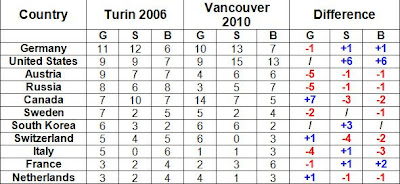
Despite an additional 4 medals at the Vancouver 2010 Olympics, approximately the same number of countries had at least one medal, 26. Some countries improved overall, the United States by the largest margin overall (Canada in terms of golds) and some countries fared much worse (Austria and Russia each lost 7 medals overall). The countries with fewer medals picked up the ones the larger countries left off.
Canada maintained its position as third overall if going by medal totals. If going by gold, Canada went from fifth to first.
Of Canada's 26 medals, 10 were from Speed Skating, split evenly amongst long and short track.
Despite having very uneven percentages at the beginning, the women/man ratio of medal count ended at 56/44. This shows strong athletes male and female in Canada. As per usual, it was the women who won more medals in the Winter Olympics overall.
Canada slightly improved in its total medals, but the increased amount of gold medals show that the "Own the Podium" program does work. Canada literally owned the program, as always, in the second week of the games.
Notice the drop off that Italy, the host country of the 2006 games had. They lost 6 medals overall, likely due to lesser funding, which will happen in Canada. The question is if we will see a medal drop off, and if we do-how much?
Overall Canada had a very successful Olympics, and has London 2012, Sochi 2014, and Rio de Janeiro 2016 to look forward to. In London, Canada will be looking to best its record of 22 (Actual record is 44, but half of the world did not compete due to the Cold War). Canada is coming off of an 18 medals in Beijing.
Overall, Canada has done very well at these Olympics and won the event that mattered to Canadians most-men's hockey. Go Canada.


No comments:
Post a Comment